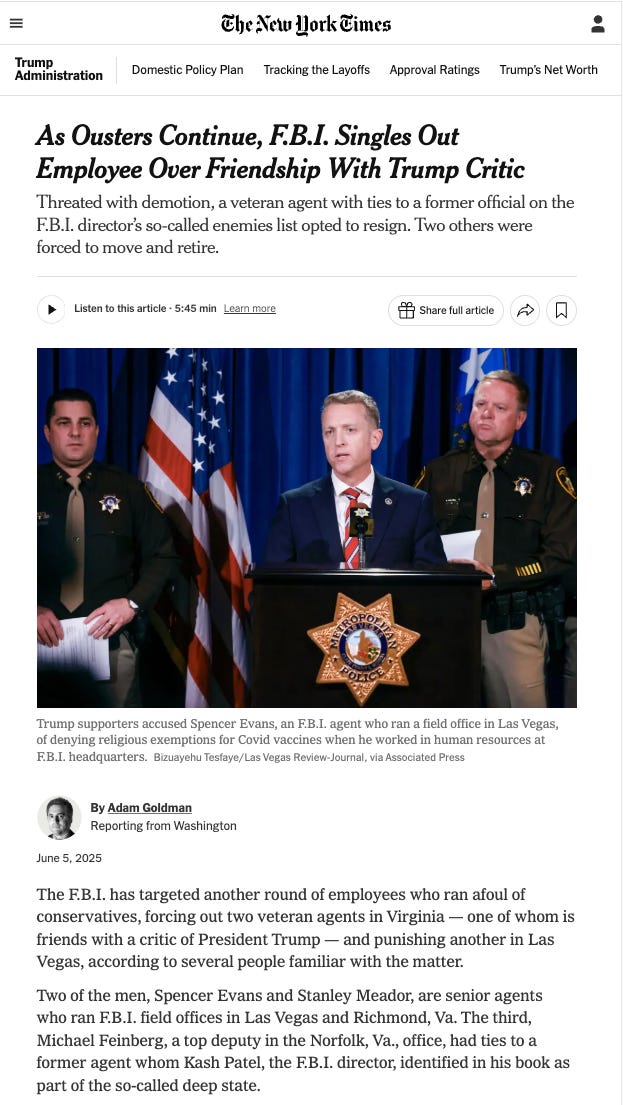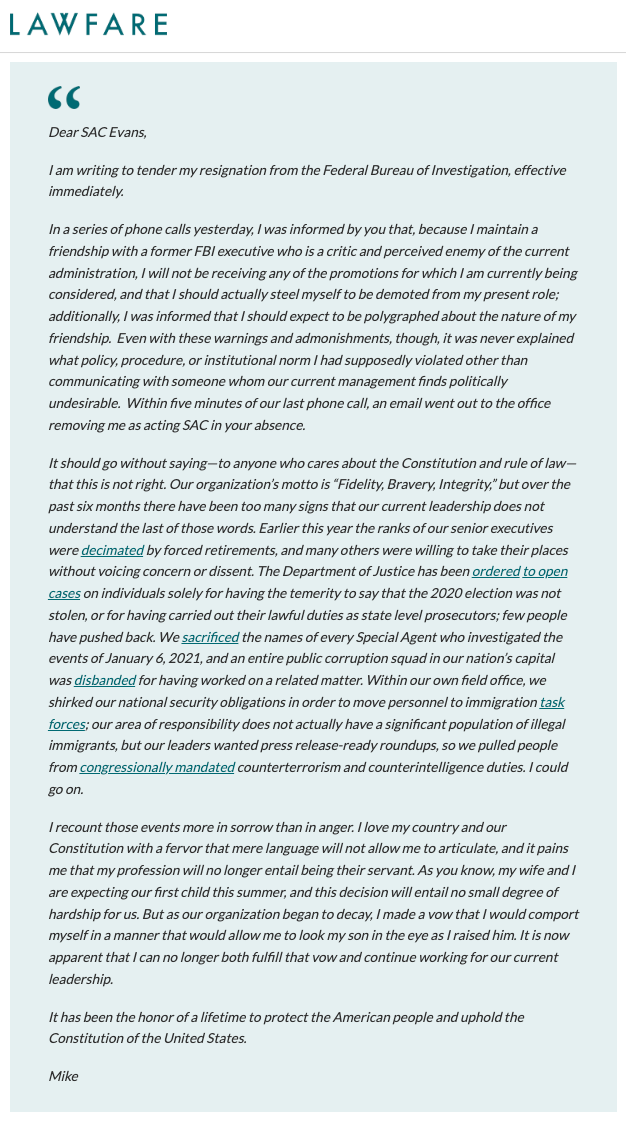The Strzok Test: When Friendship Leads To Political Purge
A career counterintelligence officer's very public resignation exposes what is now required to serve at the pleasure of FBI Director Kash Patel

A decorated FBI counterintelligence veteran has just resigned after being targeted for maintaining a friendship with former agent Peter Strzok, revealing what he describes as a systematic purge of experienced personnel under the direction of Trump appointees Kash Patel and Dan Bongino.
The resignation and subsequent letter to the public expose how political loyalty tests are allegedly replacing professional competence at the Bureau, potentially compromising national security at a time of global instability.
The emotional toll described forces agents to choose between personal integrity and career survival, signaling what he sees as a fundamental transformation of American law enforcement into a political weapon.
The tears came when Michael Feinberg removed his grandfather's folded American flag from his FBI office shelf. The same flag that had draped his World War II veteran grandfather's coffin, a man who never forgot, even in his final morphine-hazed days, that his grandson had become an FBI special agent.
Now, that legacy of service was ending not in honor, but in what Feinberg characterizes as a political purge.
Feinberg's July resignation letter, published on the legal blog Lawfare, provides his insider's account of how the FBI is being systematically hollowed out under the Trump administration's second term.
His alleged crime?
Maintaining a decade-long friendship with Peter Strzok, the former FBI counterintelligence veteran who became a conservative lightning rod after his anti-Trump text messages were revealed during the Russia investigation.
The Friendship That Ended a Career
The irony is rich. Feinberg describes himself as having conservative credentials, including serving as vice-president of his law school's most conservative organization and clerking for a libertarian firm. He claims to have been the principal architect of some of the first Trump administration's greatest counterintelligence victories against China, authoring an important indictment against Huawei, helping bar China Mobile from U.S. operations, and supervising cases against Chinese intelligence proxies.
Feinberg asserts that none of that mattered when FBI leadership discovered his friendship with Strzok. He describes the relationship as beginning innocuously between two counterintelligence professionals who bonded over music and restaurants, debating the merits of New Order versus Joy Division. Their most recent interactions, he says, involved standing together at a Morrissey concert, singing along to "Every Day is Like Sunday."
But Strzok's name appears on Patel's notorious "enemies list," published in his book "Government Gangsters," a 60-person roster of officials Patel branded as members of the "Deep State" requiring investigation and potential prosecution.
The list reads like a who's who of experienced national security professionals, from former CIA directors to FBI veterans who investigated Russian interference in the 2016 election.
The Anatomy of a Purge
Feinberg's account reveals what he characterizes as the systematic nature of the current purge. On May 31, he claims Special Agent in Charge Dominique Evans delivered the ultimatum: demotion or resignation, with the added humiliation of a polygraph examination about his friendship and what Feinberg described as a "latter-day struggle session" involving forced groveling and loyalty pledges:
“My SAC informed me in a moment she described as “brutally honest,” that I would not be receiving any promotions; in fact, I needed to prepare myself for the likelihood of being demoted. She gave me no details about what position or office I would be sent to once my time as a leader prematurely concluded.
Furthermore, she told me, I would be asked to submit to a polygraph exam probing the nature of my friendship with Pete, and (as I was quietly informed by another, friendlier senior employee) what could only be described as a latter-day struggle session. I would be expected to grovel, beg forgiveness, and pledge loyalty as part of the FBI’s cultural revolution brought about by Patel and Bongino’s accession to the highest echelons of American law enforcement and intelligence.
When my SAC revealed the concern about my friendship with Pete, and its imminent consequences, I knew that I could no longer stay at the Bureau. Within twenty four hours of my final phone call with her, I resigned, five years short of eligibility for retirement and a pension.”
He describes the emotional manipulation as deliberate. Probationary agents, many new to the Bureau, called him in "near-panic" about providing for their families if fired, according to his account. The message, as he sees it, is clear: conform or face economic ruin. The psychological pressure extends beyond individual agents to their families, with Feinberg noting his wife is pregnant with their first child, making his resignation financially devastating.
Feinberg presents this not as random house-cleaning but as the weaponization of personnel management to enforce political orthodoxy. Under Patel and Bongino, the former Fox News host now wielding power over FBI operations, he claims "subject matter expertise and operational competence are readily sacrificed for ideological purity."

The Broader Context
To understand the current purge, one must trace the arc from the 2016 Russia investigation to today's alleged retribution campaign. Strzok, a 22-year FBI veteran, became a conservative target after text messages with FBI lawyer Lisa Page revealed his personal antipathy toward Trump. Though the Justice Department's Inspector General found no evidence that political bias affected the Russia investigation, Trump and his allies painted Strzok as the face of FBI corruption.
Patel, who built his career defending Trump during the Russia investigation as a House Intelligence Committee staffer, has openly vowed to "come after" journalists and government officials he deems disloyal. His enemies list explicitly calls for criminal investigations of figures like former FBI Director James Comey and former CIA Director John Brennan.
According to Feinberg, the current administration isn't merely firing critics but conducting loyalty investigations of anyone connected to them. His case, if accurate (we have no reason to believe it isn’t), establishes a chilling precedent: maintaining personal relationships with blacklisted individuals becomes grounds for career destruction, regardless of job performance or national security contributions.
The Human Cost of Political Warfare
What emerges from Feinberg's account and should not be overlooked is his view of the profound human toll of turning law enforcement into a political weapon. Career agents who dedicated their lives to protecting America now face what he describes as impossible choices between personal integrity and professional survival. The emotional weight is palpable in Feinberg's description of packing his office, the visceral realization that his "formal term of public service was over" as he removed his grandfather's flag.
Feinberg alleges the institutional damage extends far beyond individual careers. He details how resources have been diverted from congressionally mandated counterterrorism and counterintelligence duties to immigration enforcement, politically popular but strategically questionable given what he describes as the lack of significant undocumented immigrant populations in his area of responsibility. Meanwhile, he claims an entire public corruption squad in Washington was disbanded for working January 6 cases, and the Bureau handed over names of agents who investigated the Capitol attack to the Justice Department for unknown purposes.
What Comes Next
Feinberg's very public resignation, published on a prominent legal platform rather than quietly submitted, signals what appears to be a new phase of resistance. His pledge to continue exploring these issues "in writing, in engagements with the public, and by other means" suggests we'll see more detailed accounts of what he characterizes as the Bureau's transformation.
The resignation also creates a template for other agents facing similar alleged loyalty tests. By going public, Feinberg has made it harder for the administration to quietly purge dissent while claiming everything is normal. Expect more career professionals to follow his lead, choosing public resignation over private capitulation.
The broader implications, if Feinberg's account proves accurate, are severe. If the FBI can be transformed into a political weapon, no institution may be safe. The message to current agents, as Feinberg sees it, is clear: demonstrate absolute loyalty to Trump or face professional destruction. The message to potential recruits is equally clear: this is no longer an apolitical career serving the Constitution.
As Feinberg noted in his closing, referencing the FBI's motto: "Fidelity, bravery, and integrity, forever." The question now is whether those values can survive what he describes as an administration determined to replace them with something far more dangerous: blind loyalty to a single man rather than the Constitution he swore to protect.
The tears in that Norfolk FBI office weren't just for one man's lost career, according to his account. They were for an institution, and perhaps a democracy, that he believes is in mortal peril.


Evil wins when good people do nothing.
Mike Feinberg’s public resignation is an act of bravery, patriotism, and personal sacrifice. It stands in sharp contrast to the people who have buckled under to an administration that’s eliminating competent federal workers and replacing them with political lackeys and opportunists.
Everyone faced with unjust termination must speak out loudly so the American people are kept aware of the consequences of the Trump administration’s purges.
Trump isn’t eliminating the so-called “deep state” dreamed up by his paranoid imagination — he’s firing the very competent, highly experienced, and well-trained federal employees who have made our government effective and powerful both domestically and on the world stage.
Trump must be stopped, or this will not end well for America.
The words “deeply troubling” do not even begin to describe this slow lacing, by MAGA and Republican loyalists, of their concrete boots.
Be amazed at how many are willing to walk the plank for a man unwilling to serve the American people, in good faith, his sworn (fingers crossed or not) oath of office.